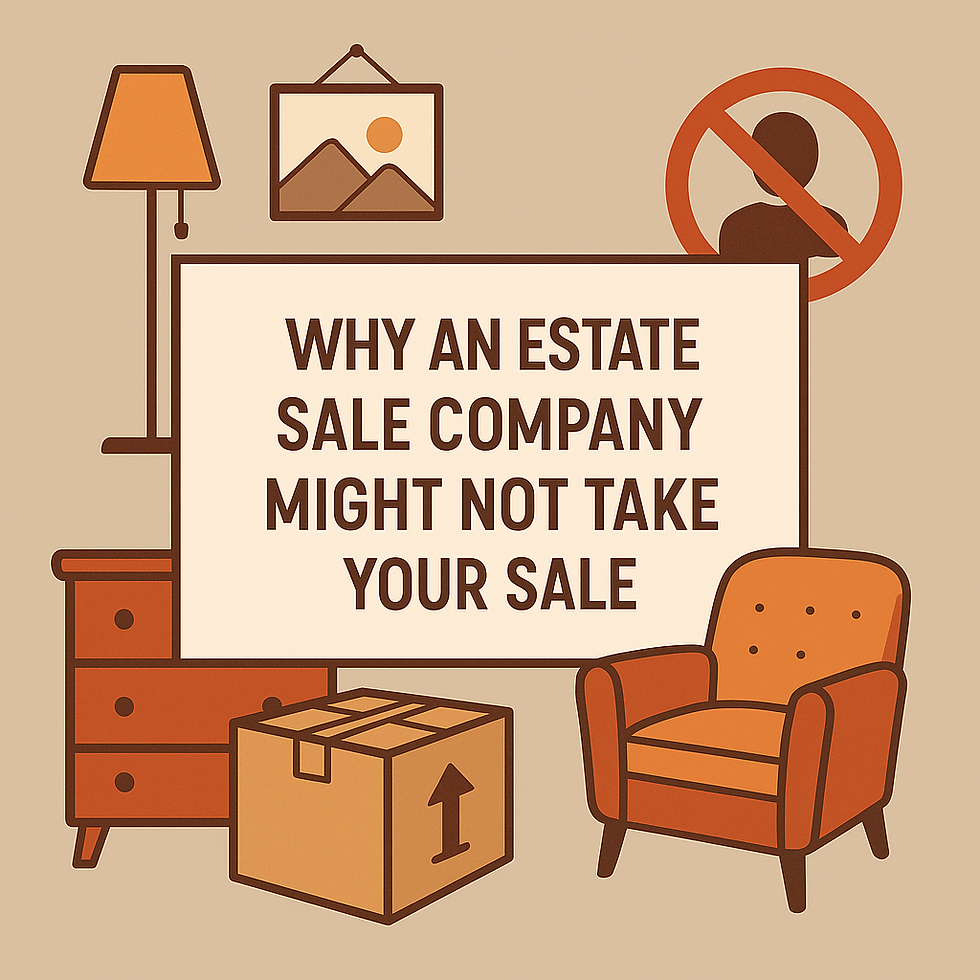Why an Estate Sale Company Might Not Take Your Sale
- Arthur Estill

- Jul 27, 2025
- 3 min read
Updated: 19 hours ago

Why an Estate Sale Company Might Not Take Your Sale Understanding the “Why Not” Behind Estate Sale Decisions
When it’s time to settle an estate, downsize a home, or liquidate belongings, many people turn to estate sale companies for help. But what happens when the company you contact says “no” to your sale?
If this has happened to you—or if you’re preparing to reach out to estate sale professionals—it’s helpful to understand why a company might decline to take on your estate sale. It’s rarely personal. Most companies want to help. But estate sale businesses operate within certain practical and financial realities. Here’s what may influence their decision:
1. Not Enough Items of Value
Estate sale companies work on commission, meaning they earn a percentage of the total sales. If the contents of the home don't add up to a certain threshold (often several thousand dollars in value), the sale may not be financially feasible for the company—or for you.
Examples of this include:
Homes that are mostly emptied before calling the company
Items that are primarily lower-value or very common (e.g., basic furniture, dollar-store items, used clothes with no designer labels)
2. The Home Is Already Picked Over
If friends, family members, or neighbors have already “cherry-picked” the best items from the estate, what's left might not be enough to draw buyers or justify the time and labor needed to stage and manage the sale.
3. Severe Time Constraints
Some estate sale companies are booked out for weeks or months in advance. If you need a sale in a few days or on very short notice, many reputable companies simply can’t squeeze it in—especially if the sale requires set-up, pricing, photography, and advertising.
4. Home Condition or Safety Issue
During estate sales, customers are required to walk through the property. If the property has hazards such as mold, hoarding conditions, damaged stairs, no electricity, or visible pest problems like mouse or rat droppings, as well as persistent pet, human, or smoke odors, a company may choose not to hold the sale due to safety and liability issues.
5. The Owner Still Lives in the Home
Some estate sale companies will not take on a sale if someone is still living in the house during the process. While this may seem inconvenient, it’s often a matter of logistics and liability. Estate sale set-up involves rearranging furniture, pricing every item, locking down valuables, and allowing large crowds to enter the home during sale hours.
If the homeowner is present and lives at the estate during this process it can disrupt flow, create privacy concerns, or even lead to confusion about what’s for sale and make the event overly stressful. Some companies may offer alternatives (like a partial sale or offsite sale), but many prefer to work in a fully vacated space to ensure a smooth, professional experience for both the seller and the buyers.
6. Too Small a Job
A full-service estate sale company typically needs a minimum number of sellable items, rooms, or square footage to justify their labor and marketing. If you only have a few boxes of collectibles, a single room, or a garage’s worth of items, the company may suggest other options—like consignment, donation, or online marketplaces.
7. Item Type Mismatch
Some companies specialize in high-end art, antiques, or luxury homes. Others are geared toward everyday downsizing or collectibles. If your items don’t fit their niche, they may decline simply because it's not their area of expertise
.
8. Scheduling Conflicts
Even if your sale is a great fit, the company may be fully booked during the window of time you’re requesting. Like any service business, estate sale companies have to balance workloads and staff availability.
9. The “Gut Feeling” Factor
Reputable estate sale companies are often booked solid, so they need to prioritize sales where the relationship is professional, and expectations are clear. If a meeting or consultation reveals major red flags (family disagreements, vague inventory, or lack of decision-maker authority), they may politely decline.
So, What Can You Do?
If your sale was turned down, don’t get discouraged. Here are a few next steps:
Ask why: Most companies will gladly explain their decision and may even refer you to someone better suited.
Consider multiple companies: Different companies have different specialties.
Explore alternatives: You may benefit more from a consignment shop, auction house, buyout service, or even a well-managed garage sale.
Consolidate items: Sometimes combining multiple households (e.g., siblings, parents, storage units) can create a more attractive sale.
At Afternoon Estate Sales Dallas Texas, we take pride in helping clients in Dallas navigate this process with honesty and transparency. If we can’t take your sale, we’ll always do our best to point you in the right direction. Because in the end, the goal is the same: to help you move forward with confidence, clarity, and value. [Click Here to Schedule Your Free Consultation]
